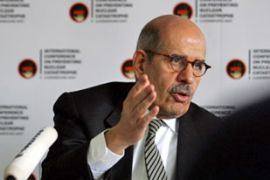Iran warns against new UN sanctions
Senior official says new measures could halt co-operation with nuclear watchdog.

Published On 30 Aug 2007
US and European diplomats have criticised Tehran for not doing enough to ease international concerns and said its recent willingness to allow a partial probe of its past nuclear activities was not enough to banish fears it wanted to make a nuclear bomb.
‘Positive’ report
The mounting tension comes as Mohamed ElBaradei, the IAEA chief, prepares to submit his latest report on Iran.
Soltanieh said he expected the report to reflect the “positive step taken by Iran” in co-operating over recent weeks with agency investigators.
“Therefore it is highly expected that this positive development will not be put in jeopardy by any immature and unjustified measures.”
The report on Iranian nuclear developments over the past three months will be presented to the IAEA’s 35-nation board on Thursday, diplomats said.
It will serve as a guide at a September 10 board meeting that will focus both on Iran’s co-operation with IAEA investigators and its continued refusal to suspend uranium enrichment and heed other security council demands.
Diplomats said the report would mostly reiterate the findings contained in a joint Iranian-IAEA memorandum published on Monday on the UN nuclear watchdog’s website that summarised the extent of Tehran’s co-operation with the agency’s nuclear probe.
Suggesting significant progress, that document said that the IAEA considered that information provided by Iran on past small-scale plutonium experiments had “resolved” agency concerns about the issue.
The memorandum also outlined a timetable for Iran to answer about programmes and activities such as the plutonium work that could be linked to a nuclear weapons programme.
But the EU and US consider the memorandum too favourable towards Iran and senior representatives of the US, Britain, France and Germany on Wednesday urged ElBaradei to introduce more critical language in his Thursday report, diplomats said.
The representatives said the suspension of uranium enrichment was ignored in the memorandum.
They also questioned the assertion that the issue of Iran’s plutonium experiments – and fears that some of the fissile material had gone missing – had been resolved, urging the agency to reopen the issue by demanding new samples from the Iranians.
Source: News Agencies